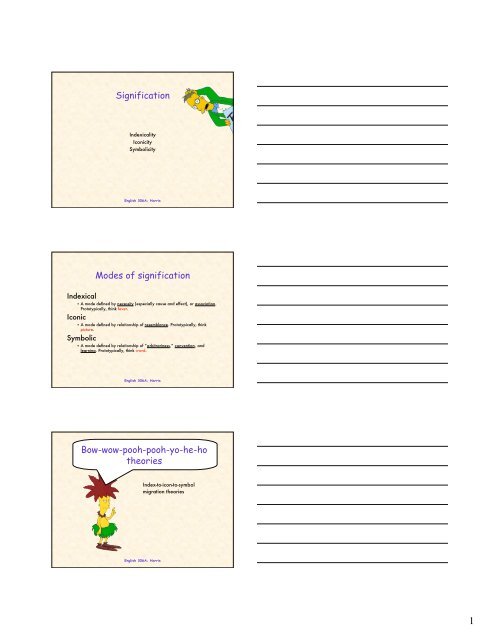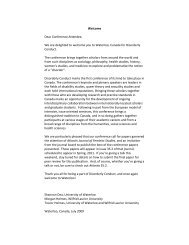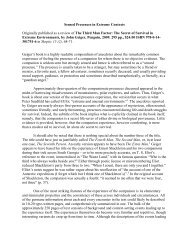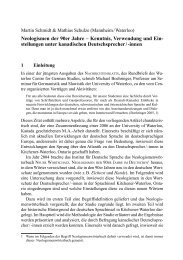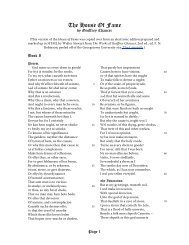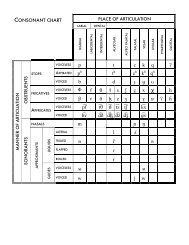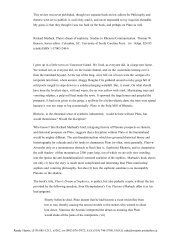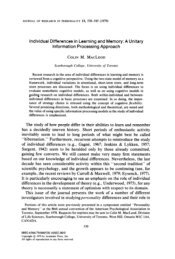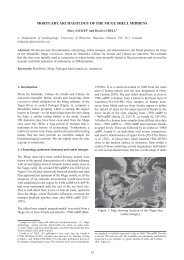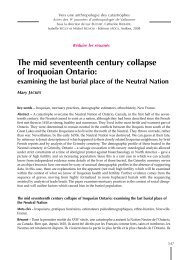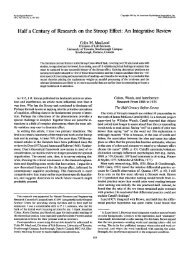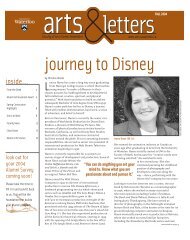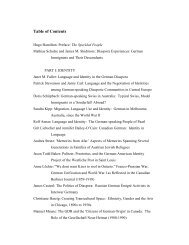Signification Modes of signification Bow-wow-pooh-pooh-yo-he-ho ...
Signification Modes of signification Bow-wow-pooh-pooh-yo-he-ho ...
Signification Modes of signification Bow-wow-pooh-pooh-yo-he-ho ...
Create successful ePaper yourself
Turn your PDF publications into a flip-book with our unique Google optimized e-Paper software.
<strong>Signification</strong><br />
Indexicality<br />
Iconicity<br />
Symbolicity<br />
English 306A; Harris<br />
<strong>Modes</strong> <strong>of</strong> <strong>signification</strong><br />
Indexical<br />
• A mode defined by necessity (especially cause and effect), or association.<br />
Prototypically, think fever.<br />
Iconic<br />
• A mode defined by relationship <strong>of</strong> resemblance. Prototypically, think<br />
picture.<br />
Symbolic<br />
• A mode defined by relationship <strong>of</strong> “arbitrariness,” convention, and<br />
learning. Prototypically, think word.<br />
English 306A; Harris<br />
<strong>Bow</strong>-<strong>wow</strong>-<strong>pooh</strong>-<strong>pooh</strong>-<strong>yo</strong>-<strong>he</strong>-<strong>ho</strong><br />
t<strong>he</strong>ories<br />
Index-to-icon-to-symbol<br />
migration t<strong>he</strong>ories<br />
English 306A; Harris<br />
1
indexicality<br />
iconicity<br />
symbolicity<br />
Signifier<br />
Semiotic triangle<br />
concept<br />
form entity<br />
English 306A; Harris<br />
Semiotic triangle (symbol)<br />
“dog”<br />
yappy, hairy<br />
quaduped<br />
English 306A; Harris<br />
Semiotic triangle (symbol)<br />
“dog”<br />
yappy, hairy<br />
quaduped Signified<br />
English 306A; Harris<br />
T<strong>he</strong> (evoked)<br />
world<br />
2
Signifier<br />
Signifier<br />
Sign<br />
(narrow sense)<br />
Semiotic triangle (index)<br />
yappy, hairy<br />
quaduped<br />
English 306A; Harris<br />
English 306A; Harris<br />
Signified<br />
Semiotic triangle (icon)<br />
yappy, hairy<br />
quaduped Signified<br />
Semiotic triangle (word)<br />
“dog”<br />
yappy, hairy<br />
quaduped<br />
English 306A; Harris<br />
Sense,<br />
Intension<br />
T<strong>he</strong> (evoked)<br />
world<br />
T<strong>he</strong> (evoked)<br />
world<br />
Reference,<br />
Extension<br />
3
Semasiology<br />
Semiotic triangle (word)<br />
“dog”<br />
yappy, hairy<br />
quaduped<br />
English 306A; Harris<br />
Onomasiology<br />
Metap<strong>ho</strong>r and metonymy<br />
English 306A; Harris<br />
T<strong>he</strong> (evoked)<br />
world<br />
Indirect representation<br />
Something (called t<strong>he</strong> vehicle) carries t<strong>he</strong> primary <strong>signification</strong> for something<br />
else (tenor) that ordinarily <strong>ho</strong>lds that <strong>signification</strong>.<br />
Metap<strong>ho</strong>r is iconic<br />
T<strong>he</strong> vehicle/tenor relationship is an asserted resemblance: t<strong>he</strong> tenor is said<br />
to be like t<strong>he</strong> vehicle in some way.<br />
Metonymy is indexical<br />
T<strong>he</strong> vehicle/tenor relationship is (not exactly necessary but) drawn from t<strong>he</strong><br />
same habitat: t<strong>he</strong> tenor is related to t<strong>he</strong> vehicle in some way.<br />
“Pig”<br />
Homer is a pig<br />
Vehicle Tenor<br />
Porcine farm<br />
animal<br />
“Homer”<br />
English 306A; Harris<br />
Simpsons<br />
pater familias<br />
4
Metap<strong>ho</strong>r and metonymy<br />
Indirect representation<br />
Something (called t<strong>he</strong> vehicle) carries t<strong>he</strong> primary <strong>signification</strong> for something<br />
else (tenor) that ordinarily <strong>ho</strong>lds that <strong>signification</strong>.<br />
Metap<strong>ho</strong>r is iconic<br />
T<strong>he</strong> vehicle/tenor relationship is an asserted resemblance: t<strong>he</strong> tenor is said<br />
to be like t<strong>he</strong> vehicle in some way.<br />
Metonymy is indexical<br />
T<strong>he</strong> vehicle/tenor relationship is (not exactly necessary but) drawn from t<strong>he</strong><br />
same habitat: t<strong>he</strong> tenor is related to t<strong>he</strong> vehicle in some way.<br />
English 306A; Harris<br />
Metonymy, metap<strong>ho</strong>r<br />
to go tyson to go ballistic<br />
Metonymy<br />
English 306A; Harris<br />
Metap<strong>ho</strong>r<br />
Metonymy—<br />
T<strong>he</strong> principle <strong>of</strong> set membership<br />
One element <strong>of</strong> a set or a relationship (t<strong>he</strong><br />
vehicle) singled out to represent ot<strong>he</strong>r<br />
element(s) (t<strong>he</strong> tenor)<br />
• Buffalo wins in OT!<br />
• Hollywood loves westerns.<br />
• All hands on deck.<br />
• Thirty <strong>he</strong>ad <strong>of</strong> cattle.<br />
English 306A; Harris<br />
5
Metap<strong>ho</strong>r—<br />
T<strong>he</strong> principle <strong>of</strong> comparison<br />
One element (t<strong>he</strong> vehicle) represents anot<strong>he</strong>r<br />
element (t<strong>he</strong> tenor), to which it is unrelated.<br />
• Homer is a pig.<br />
• My love is red, red rose.<br />
• Toronto is toast.<br />
• T<strong>he</strong> table leg is broken.<br />
• T<strong>he</strong> ort<strong>ho</strong>pedic wing is closed.<br />
English 306A; Harris<br />
Metonym<br />
Attributes are picked out (treated indexically)<br />
to represent something associated with t<strong>ho</strong>se<br />
attributes. Like a mascot.<br />
Dancin’<br />
Homer<br />
English 306A; Harris<br />
Metap<strong>ho</strong>r<br />
Attributes are invoked, by way (iconically) <strong>of</strong><br />
resemblance.<br />
Homer is a pig.<br />
• Eats a lot<br />
• Noisy<br />
• Not very clean.<br />
•<br />
English 306A; Harris<br />
6
English 306A; Harris<br />
“Pussy”<br />
English 306A; Harris<br />
“Pussy”<br />
English 306A; Harris<br />
7
“Pussy”<br />
English 306A; Harris<br />
“Pussy”<br />
English 306A; Harris<br />
“Pussy”<br />
English 306A; Harris<br />
Metap<strong>ho</strong>r<br />
• Tenor = vagina<br />
• Vehicle = felus domesticus<br />
• Attributes<br />
• Warm<br />
• Furry<br />
•<br />
8
!<br />
=<br />
“Pussy!” Stage 1<br />
English 306A; Harris<br />
“Pussy!” Stage 2<br />
English 306A; Harris<br />
Metonymy<br />
• Tenor = woman<br />
• Vehicle = vagina/pussy<br />
T<strong>he</strong> ultimate devaluing <strong>of</strong><br />
a (category <strong>of</strong> a) person:<br />
to a small anatomical<br />
component.<br />
Metap<strong>ho</strong>r<br />
• Tenor = t<strong>he</strong> insult target<br />
• Vehicle = woman (not vagina)<br />
• Attributes<br />
• Weak<br />
• S<strong>of</strong>t<br />
• Quitter<br />
• Means ‘Opposite <strong>of</strong> a man’,<br />
but in a w<strong>ho</strong>lly evaluative way.<br />
“Pussy”<br />
Metap<strong>ho</strong>r ⇒ Metonymy ⇒ Metap<strong>ho</strong>r<br />
Indexicality, Iconicity<br />
• a relatively mundane example <strong>of</strong> ordinary language<br />
• not a fancy literary or r<strong>he</strong>torical device<br />
• t<strong>he</strong>se processes, and figuration generally, are<br />
pervasive<br />
English 306A; Harris<br />
9
=<br />
“Pussy”<br />
English 306A; Harris<br />
“Pussy”<br />
English 306A; Harris<br />
Metap<strong>ho</strong>r<br />
• Tenor = t<strong>he</strong> insult target<br />
• Vehicle = a particular type <strong>of</strong> woman<br />
(still not vagina)<br />
• Attributes<br />
• Weak<br />
• S<strong>of</strong>t<br />
• Quitter<br />
• Means ‘t<strong>he</strong> sort <strong>of</strong> woman that gives all<br />
<strong>of</strong> us a bad name for being weak, s<strong>of</strong>t,<br />
quitters’ (?); in a w<strong>ho</strong>lly evaluative<br />
way.<br />
• Embeds “male” values<br />
“Dick!”<br />
Metonymy ⇒ Metap<strong>ho</strong>r<br />
Anatomical label<br />
Tenor: penis<br />
Vehicle: Famously<br />
endowed man<br />
named Dick (?)<br />
Cf. kleenex,<br />
sandwich,<br />
goldfarb, …<br />
Cf, willy, peter,<br />
johnson, …<br />
English 306A; Harris<br />
Insult<br />
Tenor: object <strong>of</strong> insult<br />
Vehicle: penis<br />
Critical attributes:<br />
• Unthinking<br />
• Self-serving<br />
• Insensitive<br />
10
We now return <strong>yo</strong>u to regular<br />
programming<br />
F<br />
English 306A; Harris<br />
Indexicality<br />
English 306A; Harris<br />
Indexicality<br />
English 306A; Harris<br />
Defined by association<br />
T<strong>he</strong>re is a connection <strong>of</strong><br />
some sort (necessary or<br />
conventional) between t<strong>he</strong><br />
vehicle and t<strong>he</strong> tenor.<br />
Egocentricity<br />
Speaker-oriented<br />
• Deixis (pointing words)<br />
Anthropocentrism<br />
Human-oriented<br />
• In<strong>he</strong>rent orientation<br />
(human-body orientation<br />
projected to objects)<br />
11
Indexicality<br />
Deixis<br />
English 306A; Harris<br />
Indexicality<br />
Deixis<br />
English 306A; Harris<br />
Gk. deiktos ≈ “to s<strong>ho</strong>w”<br />
• Pointing words<br />
Work by ‘gesturing<br />
outward’ from speaker,<br />
from t<strong>he</strong> EGO, to ot<strong>he</strong>r<br />
objects<br />
Proximals (“deictics”<br />
• Speaking location <strong>of</strong> EGO<br />
(this, that; <strong>he</strong>re, t<strong>he</strong>re; …)<br />
• Speaking time <strong>of</strong> EGO<br />
(now, t<strong>he</strong>n; today,<br />
tomorrow; …)<br />
Pronouns<br />
• Pick out attributes relative<br />
to EGO (speaker, <strong>he</strong>arer,<br />
not-speaker-or-<strong>he</strong>arer;<br />
speaker+ot<strong>he</strong>rs,<br />
<strong>he</strong>arer+ot<strong>he</strong>rs, …)<br />
Indexical orientation — Deictic centre<br />
Lexical egocentricity<br />
Proximals (“deictics”)<br />
• Speaking location<br />
• W<strong>he</strong>re-EGO-is: <strong>he</strong>re, near, …<br />
• W<strong>he</strong>re-EGO-is-not: t<strong>he</strong>re, far, …<br />
• Speaking time<br />
• W<strong>he</strong>n-EGO-is: now, today, …<br />
• W<strong>he</strong>n-EGO-is-not: t<strong>he</strong>n, tomorrow, …<br />
• Relative location to speaker<br />
• Close-to-EGO: this, t<strong>he</strong>se, …<br />
• Not-close-to-EGO: that, t<strong>ho</strong>se, ..<br />
English 306A; Harris<br />
12
Indexical orientation — Deictic centre<br />
Lexical egocentricity<br />
English 306A; Harris<br />
Pronouns<br />
• EGO = 1st person (I, me, …)<br />
• EGO+ot<strong>he</strong>rs = 1st person<br />
plural (we, us, …)<br />
• Hearer-<strong>of</strong>-EGO = 2nd person<br />
(<strong>yo</strong>u, <strong>yo</strong>ur, …)<br />
• Hearer-<strong>of</strong>-EGO+ot<strong>he</strong>rs = 2nd<br />
person plural (<strong>yo</strong>u, <strong>yo</strong>ur, …)<br />
• Not-EGO-and-not-<strong>he</strong>arer-<strong>of</strong>-<br />
EGO = 3rd person (<strong>he</strong>, s<strong>he</strong>,<br />
it, …)<br />
• Not-EGO-and-not-<strong>he</strong>arer-<strong>of</strong>-<br />
EGO+ot<strong>he</strong>rs = 3rd person<br />
plural (t<strong>he</strong>y, t<strong>he</strong>m, …)<br />
Indexical orientation — Deictic centre<br />
Expressive egocentricity<br />
T<strong>he</strong> speaker (or, in a r<strong>he</strong>torical extention, t<strong>he</strong> <strong>he</strong>arer)<br />
as t<strong>he</strong> (default) reference point for everything else.<br />
T<strong>he</strong> squirrel is<br />
behind t<strong>he</strong><br />
tree.<br />
English 306A; Harris<br />
Indexical orientation — Deictic centre<br />
Expressive egocentricity<br />
T<strong>he</strong> speaker (or, in a r<strong>he</strong>torical extention, t<strong>he</strong> <strong>he</strong>arer)<br />
as t<strong>he</strong> (default) reference point for everything else.<br />
English 306A; Harris<br />
T<strong>he</strong> squirrel is<br />
in front <strong>of</strong> t<strong>he</strong><br />
tree.<br />
13
Indexicality<br />
Anthropocentricity<br />
English 306A; Harris<br />
Gk. anthropos ≈ “man”<br />
(hu)man-centred<br />
In<strong>he</strong>rent orientation: human<br />
orientation projected onto<br />
artefacts and entities)<br />
• front, back<br />
• left, right<br />
• before, behind<br />
Deictic (egocentric) vs. In<strong>he</strong>rent<br />
(anthropocentric) Orientation<br />
English 306A; Harris<br />
Iconicity<br />
English 306A; Harris<br />
Defined by resemblance<br />
Sequential order<br />
“Don’t drink and drive”<br />
Distance<br />
Immediacy <strong>of</strong> action<br />
Quantity<br />
Reduplication<br />
14
Iconicity<br />
Principle <strong>of</strong> sequential order<br />
English 306A; Harris<br />
Unless marked, t<strong>he</strong> order<br />
<strong>of</strong> words (by default)<br />
mirrors t<strong>he</strong> order <strong>of</strong><br />
events.<br />
• He kicked sand in my face<br />
and I got mad.<br />
• I got mad and <strong>he</strong> kicked sand<br />
in my face.<br />
Iconicity<br />
Principle <strong>of</strong> distance<br />
English 306A; Harris<br />
Linguistic distance tends<br />
to mirror conceptual<br />
distance.<br />
• S<strong>he</strong> squeezed me.<br />
• S<strong>he</strong> gave me a squeeze.<br />
• S<strong>he</strong> gave a squeeze to me.<br />
Iconicity<br />
Principle <strong>of</strong> quantity<br />
English 306A; Harris<br />
Length <strong>of</strong> utterance correlates<br />
with (speaker’s perception <strong>of</strong>)<br />
quantity <strong>of</strong> concept.<br />
• Dinosaurs lived a l o o o n g<br />
time ago.<br />
• Dinosaurs lived a long, long,<br />
long, … time ago.<br />
• Lawyerese.<br />
• Political speec<strong>he</strong>s.<br />
15
ora¯/ = man<br />
/anak/ = child<br />
/ma¯a/ = mango<br />
Iconicity — Principle <strong>of</strong> quantity<br />
Reduplication<br />
English 306A; Harris<br />
English 306A; Harris<br />
Japanese<br />
hito 'person'<br />
hitobito ’group <strong>of</strong> people'<br />
kami 'god'<br />
kamigami ’group <strong>of</strong> gods'<br />
Mandarin<br />
xiao 'small'<br />
xiaoxiao 'very small'<br />
gaoxing 'happy'<br />
gaogaoxingxing 'very happy'<br />
Iconicity — Principle <strong>of</strong> quantity<br />
Reduplication<br />
/ ora¯ ora¯/ = all sorts <strong>of</strong> men<br />
/anak anak/ = all sorts <strong>of</strong> children<br />
/ ma¯a ma¯a / = all sorts <strong>of</strong> mangoes<br />
Iconicity — Principle <strong>of</strong> quantity<br />
Conceptual Reduplication<br />
Children at Play, Romeo Downer<br />
http://caribbeanartist.com/<br />
English 306A; Harris<br />
Trinidad and Tobago<br />
[jEswij]<br />
• emphatic confirmation,<br />
agreement; interjective<br />
intensifier<br />
16
Iconicity — Principle <strong>of</strong> quantity<br />
Conceptual Reduplication<br />
Children at Play, Romeo Downer<br />
http://caribbeanartist.com/<br />
English 306A; Harris<br />
Trinidad and Tobago<br />
[jEswij]<br />
• emphatic confirmation,<br />
agreement; interjective<br />
intensifier<br />
• yes-we?<br />
Iconicity — Principle <strong>of</strong> quantity<br />
Conceptual Reduplication<br />
Children at Play, Romeo Downer<br />
http://caribbeanartist.com/<br />
English 306A; Harris<br />
Trinidad and Tobago<br />
[jEswij]<br />
• emphatic confirmation,<br />
agreement; interjective<br />
intensifier<br />
• yes-we?<br />
• yes-w<strong>he</strong>e?<br />
Iconicity — Principle <strong>of</strong> quantity<br />
Conceptual Reduplication<br />
Children at Play, Romeo Downer<br />
http://caribbeanartist.com/<br />
English 306A; Harris<br />
Trinidad and Tobago<br />
[jEswij]<br />
• emphatic confirmation,<br />
agreement; interjective<br />
intensifier<br />
• yes-we?<br />
• yes-w<strong>he</strong>e?<br />
• yes-oui!<br />
17
Any questions?<br />
<strong>Modes</strong> <strong>of</strong> <strong>signification</strong><br />
Semiotic triangle<br />
Symbolicity (arbitrariness, convention, learning)<br />
Indexicality (relation <strong>of</strong> necessity)<br />
• Egocentricity (deixis)<br />
• Anthropocentricity (in<strong>he</strong>rent orientation)<br />
Iconicity (relation <strong>of</strong> resemblance)<br />
• Sequential order<br />
• Distance<br />
• Quantity<br />
English 306A; Harris<br />
18


